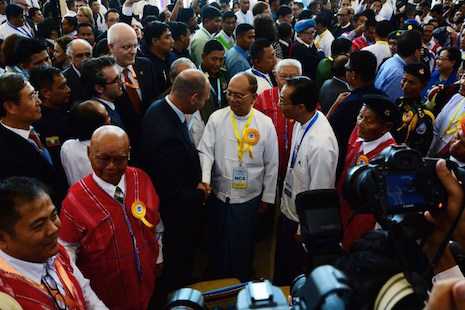
Myanmar President Thein Sein, center, attends the signing ceremony of a nationwide cease-fire agreement in Naypyidaw on Oct. 15. (Photo by AFP)
Myanmar's government is touting the signing of a national cease-fire agreement as a historic step toward peace. But analysts said the failure to include key combatants — including an armed group in a strongly Christian region — shows authorities have not delivered on a promise to end fighting ahead of highly anticipated November elections.
In a signing ceremony broadcast on state media on Oct. 15, President Thein Sein trumpeted the peace deal as a "legacy."
The agreement, Thein Sein said, represents "the mutual trust between us, and a legacy for future generations. Furthermore, the agreement unequivocally shows our sincerity."
Despite the president's optimism, however, large parts of Christian-majority Kachin state, in Myanmar's north, effectively remain in a state of civil war.
The Kachin Independence Army, one of the largest ethnic armed groups in the country, is still fighting with military forces following the breakdown of a 17-year cease-fire in 2011. More than 100,000 people have been displaced as a result of the clashes and remain in temporary camps in Kachin and Shan states.
Observers said the conflict is a central reason for the government's failure to deliver on its promise to end armed clashes in Myanmar before the Nov. 8 vote. In fact, only eight of 15 groups who participated in the national peace process were involved in the Oct. 15 agreement.
Yan Myo Thein, a Yangon-based political analyst, said the fact that only some of the country's armed ethnic groups have signed the agreement shows it is more of a "cosmetic political show" rather than a historic benchmark.
"The peace process must be inclusive of all ethnic armed groups," Yan Myo Thein said in an interview Oct. 15.
"The deal has also raised concerns about the sincerity of the government's attitude in not allowing some ethnic groups to be involved in the cease-fire agreement."
Among those included in the ceremony in the capital, Naypyidaw, was the Karen National Union, whose armed wings fought with the military for more than six decades until a 2012 ceasefire — though there have been skirmishes after as well.
Still, hundreds of thousands of Karen people live in refugee camps on either side of the Thailand-Myanmar border.
Tu Ja, a Catholic Kachin politician with the Kachin State Democracy Party, said that any meaningful peace agreement has to include all ethnic groups. Still, Tu Ja saw reason to be positive.
"I think other groups that didn't sign today need to make more discussions and can sign it later," said Tu Ja, who is also the former vice president of the Kachin Independence Organization, which is the political arm of the Kachin Independence Army.
"I see today's signing as a beginning step and it must move forward. The crucial thing is to end fighting and make a cease-fire agreement."


